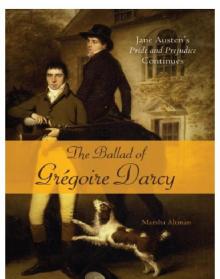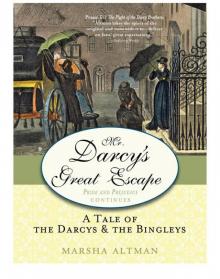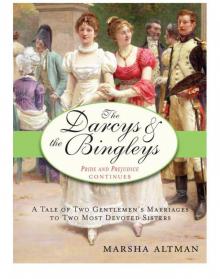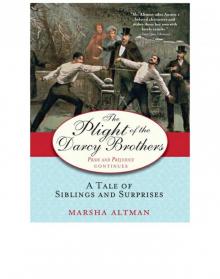- Home
- Marsha Altman
The Plight of the Darcy Brothers Page 25
The Plight of the Darcy Brothers Read online
Page 25
“Well, I only know two people here who are poor,” Wickham said. “And it seems the Darcys are responsible for that.”
“You are mistaken by his pious appearance,” Darcy said. “Unlike you, Grégoire has not squandered his inheritance gambling.”
“Inheritance?” Wickham laughed. “You call three thousand pounds to buy me off when your father passed away an inheritance? Do you know how long that lasted?”
“And the ten thousand to settle your gambling debts and provide you with a living in Newcastle. The thousands Father spent raising you, educating you, and sending you to Cambridge. At least you had the decency to be sent down in the first semester, since all you were going to do was—”
“Brother!” Grégoire interrupted, a look passing between him and Darcy that Wickham could not observe from his viewpoint. So the monk was to be his advocate? He was going to make this even easier? “Tell him.”
“Tell me what?” Wickham said, curious.
Darcy sighed, and it was not a sigh of annoyance. Wickham knew Darcy's frustrated sighs well enough. This was almost sadness. It crept into his voice when he spoke, more civilly this time, directly to Wickham. “It seems… you are my half-brother as well.”
George Wickham blinked. “Are you daft?”
“Surely your scheming mind can work your way around that one,” Darcy replied, stepping closer to him in front of his father's grave. “I admit Father had me fooled, too, while he was alive. But why else would he raise you 'as his own son' and give you a living that you proved over and over again was undeserved? A living in the church, of all places! His last attempts to hope to reform you, even when that was beyond hope. How many maids did he have to dismiss? How far did you spread the Darcy seed around?”
To say that Wickham was flabbergasted was putting it mildly, but he knew that Darcy could be as tricky as he could. “You are a fool if you don't think I see your strategy. You are trying to draw me into your own little family scandal so that I cannot ask for money for my silence, and you apparently would go as far as slandering your own father to do so.”
“Despite my lack of desire to believe it, your father was, in fact, my father,” Darcy said. “So the only person slandered here, beyond him, is your mother, who was married to Mr. Wickham at the time, which is a sin above Father's own… dalliances with his wife's lady-maid.”
He was getting angry. Wickham was not at his best when he was angry. He didn't like being angry either, especially when he was trying to get money from people. He could not think of a way—no, he had one. If Darcy was to up the scale, so would he. They were alone. The setting was perfect.
“Darcy, you have slandered both my parents to a point that is unsuitable, and as a gentleman—and you may laugh at the idea if you wish—I must defend their honor. I challenge you to a duel.”
Darcy gave him one of those perfectly clear “You can't be serious?” looks of his and scoffed.
“I am serious,” Wickham said. “Most serious.”
“I cannot shoot a—brother.”
Maybe Darcy really did believe it. Well, Darcy was a fool, or he was playing some game beyond Wickham's own. “Then to first blood. I will be at the disadvantage, as you are better with the blade than I am, so accept my poor lieutenant's spare in place of your expert rapier. Just so you don't cut me to pieces immediately.”
“You have two? On you?”
“Of course. I am, despite my own intentions, in His Majesty's service,” Wickham said, returning to his horse to retrieve the blades.
“Darcy.” Wickham heard Gregory, or whatever his fancy name was, in the background. “You cannot fight on consecrated ground.”
“It appears I do not have a choice. Wickham?”
But Wickham was a step ahead of him, literally. As he spun around, he carried two blades in one hand and his pistol in another, whereupon he fired and shot Darcy.
“My hand! You bastard, my hand!” Darcy fell to his knees, clutching his wounded right hand. Grégoire, ever his attendant, ran to his side and looked at the wound.
“It has gone straight through,” he said, removing his cowl and tearing off a piece of the linen to wind around Darcy's hand.
“You could not expect me not to even the playing field,” Wickham said. “You are too good on your strong side for almost any man in England who is not a professional fencer.”
“You bastard,” Darcy groaned. “You ignorant, stupid son of a whore! And this time, I mean it literally!”
“You're not doing it correctly, you damned monk,” Wickham said, approaching them. Grégoire did not put up much of a fight as Wickham pushed him aside, pulled loose Darcy's cravat, and wrapped it tightly around the wound. The bullet had apparently gone right through his hand. “An excellent shot, if I do say so myself.”
“You bastard,” Darcy snarled as Wickham tightened the bandage and tied it off. “If I call for my servants—”
“They won't hear. And if you send your 'brother' for help, I'll shoot him. Now.” He released Darcy's hand. “Let's establish the terms. Since I've already drawn first blood, we'll have to go for second. If I succeed, I want an apology and a proper living. How much does Gregory have?”
“Don't tell him,” Darcy said to his brother, but Wickham merely cocked his pistol, and Grégoire looked terrified.
“Three—three thousand a year.”
“He gets three thousand a year? What does he do? Did he buy his way into heaven?” Wickham said in disbelief. “Then those are my terms. State yours.”
“You take a post in the Indias, preferably in a hostile area.”
“Self-imposed exile, yes? With a little possible death thrown in to free up Mrs. Wickham so she can properly remarry? Very noble of you. She may be a cow who squeals like a pig, but you know, she does have her positive qualities. I bet Elizabeth would never—”
“Wickham,” Darcy interrupted. “My sword.”
“Then the terms are agreed?”
“Yes!” Darcy must have been aware that he was bleeding badly despite the bandages, and would lose energy with that, so time was on Wickham's side. “Grégoire, stay back, but if he tries to shoot you, I'll run him through. And Wickham, you would be shooting your own half-brother.”
Wickham was indeed beginning to wonder if the story was true. After all, Darcy would be the last person in the world to want to admit any relation whatsoever to him. As a bastard, out of wedlock, Wickham could never make a claim on Pemberley or any part of Darcy's various land holdings, but he could reasonably demand more money than he was currently receiving from pay and his wife's income. But that would mean his father had been hoodwinked, and that Mr. Darcy was one of the worst kinds of men. And then, he realized, there was the matter of Georgiana. If he was half-Darcy, then he had almost—No, he was not ready for that yet.
There was an order to things.
Darcy knew he was at a loss. He could fight with his less-used left hand; that much was true. But he was older now and out of practice with his months of traveling, and he had been wounded on his left side not even two years before. And there was the small matter of his bleeding, throbbing right hand as a major distraction. Was he good enough now, in this state, to beat Wickham? The man was a military officer, even if he had never seen active duty. He must have trained.
As Darcy took the sword in his hand, he contemplated just giving in to Wickham's demands. They were outrageous, true, but the money was no more than what Grégoire received, and surely some of it would go to support Lydia Wickham and her children, who were his niece and nephew on both sides and were of his bloodline, at least by a quarter. They deserved not to live in poverty, even if Wickham did.
But no—he had been challenged, and his honor demanded that he defend himself for as long as he could stand. However, he doubted that would be very long. Slowly and carefully, he adjusted his hand to the blade's unfamiliar hilt and took his stance. “I would shake on it, but it seems I am without a free hand.” His voice came out tinnier than he wo
uld have liked. Perhaps he would not speak much.
“Brother, please,” Grégoire pleaded with him by his good shoulder, which once had been considered his bad shoulder before an injury forced Darcy to switch sides. “Not in front of Father, on holy ground.”
“If your estimations are correct, Darcy, there is no more deserving a witness,” Wickham said, gesturing to the gravestone of Geoffrey Darcy.
“He is right, perhaps,” Darcy said. “For once in his life. Stand back, Grégoire, and we shall finish it.”
It was not quite their old childhood games. As they touched tips in some kind of gesture of respect, even though there was none, Darcy wished it were merely a game. Was it the blood-loss induced haze, or were the memories of his younger days of playing with Wickham choosing to come back to him now for some nefarious purpose? This was not the way he wanted things to happen. True, he had put off planning a confrontation, but he could not think of a way for it to go more horribly wrong. And he had just jinxed himself by thinking that.
Wickham struck first. Darcy knew he would do that. Wickham did not have the patience or the intelligence to do otherwise. He thought he was a snake, lying and waiting for his prey, but though he had many serpentine qualities, he was more like a charging boar of smugness and ferocity. He came at Darcy, who responded with an easy parry, but only because he knew Wickham. He knew he would have to strike back, before the blows started falling heavily. Parry, parry, parry. “Damn it, hit me, Darcy! You know you want to run me through!”
Trying to incite him. Wickham was good at that, and Darcy had to admit that he was not in the best of moods to begin with and would have to calculate that in. He could not drone out Wickham's calls altogether, but the pounding in his ears was helping him out in that respect. His blood was up, and Wickham knew it, and the reverse.
The “second blood” they drew would not be a gentleman's prick. Both men knew that; it did not have to be spoken. So he had to parry and parry on auditory and physical fronts. Deflect. Protect. Himself. Grégoire. Pemberley. Elizabeth. His son and his future child. Everything was at stake here, and he was not a gambler. He was not comfortable with those high stakes.
But Wickham was. He was brazen, continuously trying to draw Darcy out, continuously attacking to wear him down. Either strategy could easily work. But Darcy blocked. He blocked again and again until it became like a dance, like a dream. Wickham was darkness, and he was light. He was truly the knight in shining armor. The Lady in the Water had given him a magic sword, and he could pierce Wickham's black heart.
He was probably hallucinating. Loss of blood, of course. He squeezed his hand, but that just made the wound bleed that much worse. There were cries from Grégoire to stop, stop this madness, but he barely heard them. Then there was a blur in front of him, all grey robes, as Wickham thrashed, pushing him back against another tombstone. Darcy comprehended that the blade would have gone to his heart, not a gentlemen's duel wound but a killing blow, and his arm may or may not have responded to the brain's call to parry. But that was irrelevant, because Grégoire had tackled Wickham, and they were rolling around on the ground. There was a gunshot, and the little monk slumped against the stone, trailing blood behind him. Had Grégoire been using the Discipline again? No, Darcy remembered taking that away. And now he was having that conversation again with Grégoire.
“I will personally pay for the abbey to acquire a new one if they press me on it,” he had said, was saying again, at least in his mind.
No, better to imagine he was back at Cambridge, fighting a match against a worthy opponent. That he could understand. His opponent, not properly guarded and masked, was picking himself off the ground. He was open. He knew, within the lines, he could not drop his guard. He had violated the rules. There would be punishment, and Darcy would deliver it.
Darcy's blade went right through Wickham's uniform, then his flesh, and then his organs and bones. He could feel it. Darcy could hear it and feel the tip break through the other side, as if an extension of his own hand, his left hand, but still his hand.
“F-First—first blood,” Darcy stammered as Wickham, still standing because he was probably in shock. Darcy pulled back his weapon, out the same way it had come with a burst of blood. “Second, technically.”
But hatred would not die so easily. Wickham raised his pistol, but Darcy dropped his sword, and with both hands—and very painfully—managed to lift the gun so the shot went off into the sky, leaving only a small ball of smoke to cover their faces with gunpowder. Wounded, angry, and flailing, Wickham tackled Darcy and bashed him in the lower back with his sword hilt, unfortunately made of steel. Both men went over together and rolled to the grass, where they managed to separate.
Being off his feet felt immeasurably good, even if he could barely breathe and his back was still figuring out which nerves to activate and his hand was still bleeding. Beside him, beyond the pounding in his ears, he heard Wickham's ragged breaths as he tore open his jacket and shirt, soaking his hands in blood in the process.
Then there was silence, except for the sounds of Derbyshire on a pleasant fall afternoon, when the leaves were at their best color, and the birds were chirping their last before heading south for the winter.
“Darcy?”
“Hmm?”
“You… you meant what you said?”
He had to gather a bit of strength to respond. “I don't… properly remember everything I might… have said. Remind me.”
“We are brothers?”
“So it seems.” He picked his head up just a bit—a painful endeavor—to see Grégoire still slumped against the tombstone, his eyes closed but breathing. He looked the other way, to Wickham covered in his own blood, and craned his eyes above. They were, appropriately, in front of his mother's and father's stones.
“Then we are… terrible at it.”
“At what?”
“Being brothers.”
“So it seems.” His brain wasn't processing a lot. He was resting in a pool of agony, but the resting part was wonderful. “Cain and Abel.”
“Unless we… both die.”
“Cain never died.”
“Yes he did.”
“No he didn't.”
“Did.”
“Didn't.”
Despite everything, Darcy found himself laughing. He found Wickham joining him, until they were both too exhausted from the process. That did not take very long, and then they were quiet again.
“I love Elizabeth,” Darcy said. “I want those to be… my last words.”
“I love… uhm…”
“… Money?… Gambling?… F-Fratricide?”
“My… best qualities.”
It was getting late. It was still early in the afternoon, but it felt so very, very late.
“I didn't… mean for—I just wanted money… Darcy.”
“I know.”
“I didn't—kill Gregory… did I?”
“Grégoire.”
“Whatever.”
“No… I don't know… I can't—get up.”
He heard George slowly rise to his feet. It was a concentrated effort, and when he stood, he was hunched over, one hand desperately clutching the wound in his chest as he towered over Darcy. “If I don't survive… I'm sorry about Georgiana,” he stopped to grunt, as if his very insides were shifting around in him. “I didn't know.”
“I didn't either,” Darcy said. “Where are you going?”
“To get… some help.” He tried to straighten up but failed. “Agh!” He made his way to his horse, where he leaned on the animal and tugged weakly on the stirrups. Finally he was able to climb into the saddle. Darcy saw little more than a shadow. He was seeing little more than shadows and darkness now. “Darcy.”
“George.”
As the shuffling of the hooves of the beast disappeared into the distance, Darcy sighed and let the last of his strength flow out of him.
REQUIEM
IT WAS LATE IN the day, and Elizabeth Darcy realize
d she and Georgiana needed to be home for dinner, but first she had to find her son. This, of course, was no easy task. The Bingley twins were running now, and she had to carefully sidestep them to avoid their collision in order to find her son somehow on top of a very large bookcase.
“I don't even want to know. Come to Mother.”
Geoffrey eagerly obeyed, though she was glad to put him down when she had him safely out of danger. “Now don't bump into your cousins. Really, someone should be watching them.”
But the entrance of Georgiana Bingley, who ran up to him and whispered something in his ear, distracted him enough.
“Coming!” said Bingley, either having heard Elizabeth or following his fatherly instincts. “Eliza! Charles!” He picked up his daughter, handed her off to her namesake for the sake of convenience, and then scooped up his son. “Now! What did I say about running in the house?”
Elizabeth looked down and noticed her son was tugging at her skirts. “What? What is it?”
“Georgie wants to tell you something.”
“Well, she can very well tell me herself. I am her aunt.”
“But it's our secret. No one else saw it.”
“Georgiana?” Bingley looked at his daughter. “What is it?”
“I was going to tell Geoffrey,” his elder daughter said. “There's a red horse on the road.”
“A red horse?”
“It's a horse, and it's all red.”
Elizabeth and Bingley exchanged glances. “Can you tell us where you saw it?”
She nodded eagerly.
“See, just delayed,” he said, referring to her speech. “All right, you're both very good children for telling us. Let's go.” He handed his son off to Nurse, who had appeared behind him, and Elizabeth dropped her niece off as well before they followed Georgie through the hallway and out the front doors of Chatton. She broke into a full run, and Geoffrey kept pace with her.

 The Knights of Derbyshire
The Knights of Derbyshire Other Tales: Stories from The Ballad of Gregoire Darcy
Other Tales: Stories from The Ballad of Gregoire Darcy The Ballad of Gregoire Darcy
The Ballad of Gregoire Darcy Mr. Darcy's Great Escape
Mr. Darcy's Great Escape The Darcys and the Bingleys
The Darcys and the Bingleys The Plight of the Darcy Brothers
The Plight of the Darcy Brothers The Road to Pemberley
The Road to Pemberley